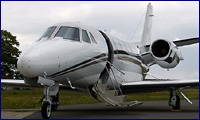How to Book an Executive Charter Aircraft
More businesses are using executive charter aircraft to save their employees time and the company money. But how do you go about booking such a trip safely?
By Sally Longson
 “The
process is fast – we’ve had people take off within an hour
of calling us,” Amanda Galanopoulos, Operations Director at London
Executive Aviation, says.
“The
process is fast – we’ve had people take off within an hour
of calling us,” Amanda Galanopoulos, Operations Director at London
Executive Aviation, says.
The steps to take are:
- As an Administrative Assistant, you call the executive aircraft operator
with these details:
- number of passengers
- their final destination
- the date of the trip
- the time they have to be there
- The aircraft operator prices this for you and sends you the costing by fax or email or talking it through with you on the phone
- It asks for written confirmation of your requirements: time, day, place, number of passengers, whether you need road transport to the airport and upon arrival, special catering needs
- The operator sends you a written confirmation to sign, with contact details and a map of where your boss should go
- You send your boss’s passport details to the aircraft company for clearance with customs and immigration
- On arriving at the airport, your boss goes to the airport’s handling agent to meet the crew, has a final passport check, and walks out to the aircraft. If he has to wait for a colleague, he can enjoy a coffee
Questions to ask include:
- Get a copy of the company’s current Air Operator’s Certificate (AOC). “This licence is issued for the operator by the Civil Aviation Authority, which governs air transport. It has to follow specific annual procedures with regards to the training and fitness of the pilots, and the maintenance of the aircraft. These standards are equally applicable to executive aircraft charter operators and scheduled airlines. The AOC should cover third party liability and should not be for less than $50 million.
- Ask for a copy of the insurance certificate for the aircraft
- How many years has the company been operating?
- How many aircraft does it have in its fleet? If they have one and it is delayed on another flight, your trip will be affected. Make sure the company has back-up aircraft
- Which aircraft in the fleet is most appropriate for the number of passengers you have and their journey?
- Does it have a 24 hour operations department, enabling you to make last minute schedule changes?
- What does the cost cover? Are there any hidden extras, such as paying for a small airport to extend its opening hours late into the night?
- Is the airport you propose to use the best one for the final destination of your passengers? “A smaller airport such as Le Bourget in Paris may be more appropriate than one like Charles De Gaulle; it’s closer to city centre, which saves your boss time,” Amanda Galanopoulos explains.”
- Does your company have corporate guidelines limiting the number of employees you can put on the same aircraft?












